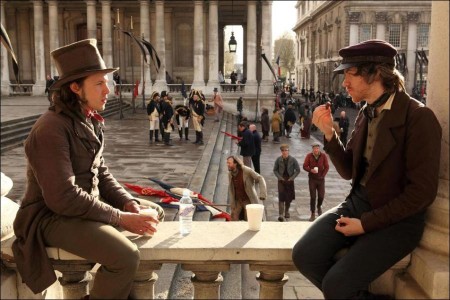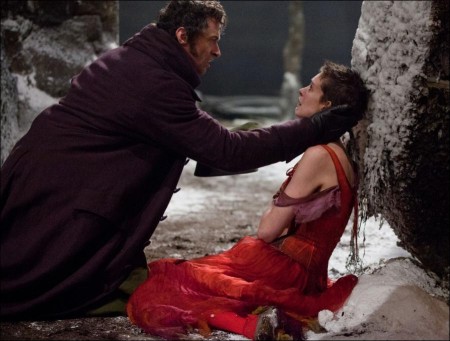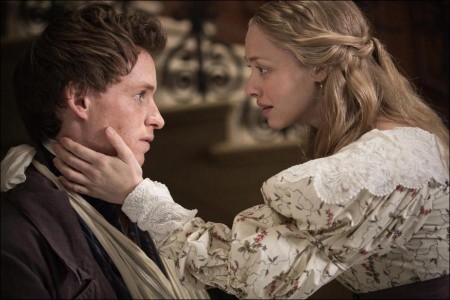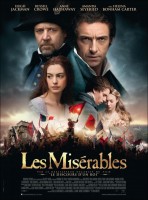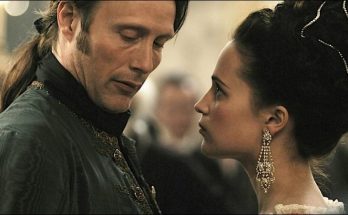Taglines: Fight. Dream. Hope. Love.
The story follows former prisoner Jean Valjean (Hugh Jackman), who, after being released from the watchful eye of police officer Javert (Russell Crowe), is unable to find work because of his status as an ex-convict. He eventually steals from a local church, but when apprehended, the priest claims that Valjean was given the valuables. This triggers a change in Valjean, and he constructs a new identity for himself as a pillar of society and a local businessman.
Years later, he adopts a young girl named Cosette, whose mother Fantine (Anne Hathaway), a former employee of his, became a prostitute and died a horrible death in the gutters after being fired. As the years progress and the French Revolution begins to foment, a grown Cosette (Amanda Seyfried) falls for a passionate revolutionary named Marius (Eddie Redmayne), while Javert begins to close in again on Valjean’s secret past.
Les Misérables is a 2012 musical drama film directed by Tom Hooper and scripted by William Nicholson, Alain Boublil, Claude-Michel Schönberg, and Herbert Kretzmer, based on the 1862 French novel of the same name by Victor Hugo, which also inspired a 1980 musical by Boublil and Schönberg. The film is a British and American venture distributed by Universal Pictures. The film stars an ensemble cast led by Hugh Jackman, Russell Crowe, Anne Hathaway, Eddie Redmayne, Amanda Seyfried, Helena Bonham Carter, and Sacha Baron Cohen.
The film takes place in France during the early 19th century and tells the story of Jean Valjean who, while being hunted for decades by the ruthless policeman Javert after breaking parole, agrees to care for a factory worker’s daughter. The story reaches resolution against the background of the June Rebellion.
Film Review for Les Miserables
ike a diabolically potent combination of Lionel Bart and Leni Riefenstahl, the movie version of Les Misérables has arrived, based on the hit stage show adaptation of Victor Hugo’s novel set among the deserving poor in 19th-century France, which climaxes with the anti-monarchist Paris uprising of 1832. Even as a non-believer in this kind of “sung-through” musical.
I was battered into submission by this mesmeric and sometimes compelling film, featuring a performance of dignity and intelligence from Hugh Jackman, and an unexpectedly vulnerable singing turn from that great, big, grumpy old bear, Russell Crowe. With the final rousing chorus of “Do you hear the people sing?”, the revolutionary-patriotic fervour is so bizarrely stirring, you’ll feel like marching out of the cinema, wrapped in the tricolour, and travelling to Russia to find Gérard Depardieu and tear him limb from limb.
Just as some celebrities are so successful they come to be known only by their first names, this is known everywhere by its abbreviation: Lay-miz, impossible to say without a twinkle of camp. It’s enjoyed staggering global success on stage since 1985. This version, directed by Tom Hooper, of The King’s Speech fame, has all the singing recorded live on set, with actors listening to a pianist via earpieces, and the orchestral soundtrack added later. The result is a bracing, rough-and-ready immediacy from performers who can and do hold a tune.
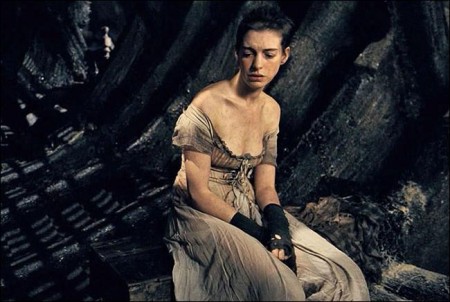
Les Misérables tells the story of Valjean (Jackman), a proud and decent man imprisoned for stealing bread to save his sister’s family from starving. Once released, he is viciously pursued by police officer Javert (Crowe) for breaking the terms of his parole, but makes a Hardyesque career leap into respectability, becoming a mayor and factory owner. His path crosses that of his poor employee Fantine (Anne Hathaway) whose grownup daughter Cosette (Amanda Seyfried) is to fall fatefully in love with revolutionary firebrand Marius (Eddie Redmayne) just as Paris erupts in violence, and as Valjean must make his final reckoning with Javert.
It conquers its audience with weapons all its own: not passion so much as passionate sincerity, not power so much as overwhelming force. Every line, every note, every scene is belted out with diaphragm-quivering conviction and unbroken, unremitting intensity. The physical strength of this movie is impressive: an awe-inspiring and colossal effort, just like Valjean’s as he lifts the flagpole at the beginning of the film.
You can almost see the movie’s muscles flexing and the veins standing out like whipcords on its forehead. At the end of 158 minutes, you really have experienced something. What exactly, I’m still not sure. But just as the inquisition got Galileo to recant just by showing him the instruments of torture, I felt that Hooper had stepped from the unparted curtains before the feature began, fixed my gaze, pointed at a large wringer he had brought on stage and said: “Whinge all you want. You’re going through this.”
The most affecting scene comes in his movie’s opening act, as Valjean is astonished and moved by the Christ-like charity of the Bishop (Colm Wilkinson) who takes him in, and forgives him for attempting to steal silverware, making him a present of it and protecting him from arrest (“I have saved your soul for God”). Jackman sings a soliloquy directly to camera (“Why did I allow this man to touch my soul and teach me love?”), eyes blazing with a new knowledge. There’s no doubt about it, this scene packs a massive punch.
Other moments are less successful. Hathaway’s fervent rendition of the SuBo standard I Dreamed a Dream, in extreme close-up, has been much admired, but for me her performance and appearance is a bit Marie Antoinette-ish. Her poverty-stricken character is supposed to have pitifully sold her teeth to a street dentist. Conveniently, this turns out to mean just her back teeth: her dazzlingly white front teeth are untouched. Sacha Baron Cohen and Helena Bonham Carter are great as the dodgy innkeepers M and Mme Thénardier, but the crowd scenes have a thumbs-in-the-waistcoat feel, and when smudgy-faced urchin Gavroche (Daniel Huttlestone) addresses grownups in Cockney as “my dear” then we really are in Jack Wild territory.
The star is Jackman. But Crowe offers the most open, human performance I have seen from him. His singing is so sweetly unselfconscious that there is something paradoxically engaging about his Javert, even when he’s being a cruel, unbending law-officer and royalist spy. I’ll never love Les Misérables the way its fans love it, and I’m agnostic about Claude-Michel Schönberg’s surging score, with its strange, subliminal weepiness. But as big-screen spectacle, this is unique.
Les Miserables (2012)
Directed by: Tom Hooper
Starring: Hugh Jackman, Russell Crowe, Anne Hathaway, Amanda Seyfried, Sacha Baron Cohen, Helena Bonham Carter, Aaron Tveit, Samantha Barks, Daniel Huttlestone, Josef Altin
Screenplay by: William Nicholson, Alain Boublil
Production Design by: Eve Stewart
Cinematography by: Danny Cohen
Film Editing by: Chris Dickens, Melanie Oliver
Costume Design by: Paco Delgado
Set Decoration by: Anna Lynch-Robinson
Art Direction by: Grant Armstrong, Gary Jopling, Hannah Moseley, Su Whitaker
MPAA Rating: PG-13 for suggestive and sexual material, violence and thematic elements.
Distributed by: Universal Pictures
Release Date: December 25, 2012 (United States), January 11, 2013 (United Kingdom)
Hits: 157
